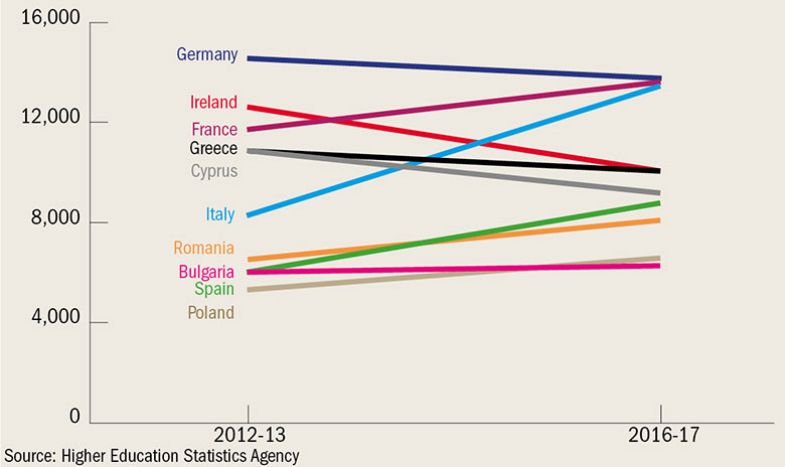A planned agreement allowing Irish students to continue to qualify for home fee status and student loan funding in the UK after Brexit is “discriminatory” and could imperil the UK’s continued participation in European Union higher education programmes, experts have warned.
Universities minister Sam Gyimah told a conference on UK-Ireland relations on 10 May that the UK was “committed to maintaining rights of Irish nationals to access higher and further education courses on a reciprocal basis”, and that this “includes rights to qualify for home fee status, student loans and other support, subject to meeting the same eligibility criteria as UK nationals”.
Mr Gyimah said that the UK government was “working towards agreeing the high-level principles with Ireland, and considering the exact details of future eligibility criteria for student loans and support in England following the end of the implementation period in December 2020, including ways to ensure that Irish students continue to have access to student finance support”.
The statement came amid continuing uncertainty about the eligibility of students from the rest of the EU for home fee status and student loan funding once the UK leaves the bloc in 2019. While there are currently about 10,000 students from Ireland enrolled in UK higher education institutions, about 14,000 come from Germany, with France and Italy following close behind.
Many UK universities fear a significant drop in EU recruitment post-Brexit, with the expectation that most students from the Continent will have to pay full international fees and will be unable to access student loans to pay for them.
Louise Richardson, vice-chancellor of the University of Oxford, told Times Higher Education that she “welcomes the minister’s commitment to reciprocal rights for British and Irish students”. She had opened the event hosted by the British Irish Chamber of Commerce by expressing fears that Brexit “will cause a decline in the numbers of students coming to Oxford from other European countries”.
The planned agreement has also been seen in the context of the impact of Brexit on the Good Friday Agreement and relations between Northern Ireland and the Republic. Mark Ferguson, the chief scientific adviser to the Irish government, said that any difficulties introduced by Brexit threatened “20 years of peace…[and] the complete blurring of this idea of ‘them’ and ‘us’”.
But Kurt Deketelaere, secretary general of the League of European Research Universities, questioned whether apparent special treatment threatened the UK’s membership of initiatives such as the European Higher Education Area and the Erasmus+ mobility programme.
Mr Gyimah had “better first talk with a lawyer before introducing [or] announcing discriminations”, Professor Deketelaere told THE.
While non-EU countries already participate in the Erasmus+, they must comply with rules set by the EU, and Professor Deketelaere's comments suggest that some member states may be unhappy with a policy that raises questions of special treatment.
Professor Deketelaere said: “What can be the motives for this equal treatment for UK and Ireland and to discriminate against the rest of the EU?”
European Union countries of domicile (excluding the UK) in 2016-17 for HE student enrolments in the UK, 2012-13 and 2016-17

Nick Hillman, director of the Higher Education Policy Institute, said that personalised deals with EU countries could be one option for post-Brexit higher education relations, but raised concerns about the amount of bureaucracy that this would introduce.
“Fixing lots of reciprocal arrangements would put some welly behind the government’s claims to want a very close continuing relationship with EU members after Brexit, and it would be welcomed by the university sector as better than some alternatives,” he said. “But the hope must surely still be for a wider reciprocal deal rather than clunky country-by-country bilateral arrangements.”
Hepi has already suggested that any savings from not having to provide loans to students from the EU should be reinvested in an outward mobility scheme for British citizens going abroad.
Any UK-Ireland deal would also have to address the status of UK students studying south of the border. Their fees, like those of all EU nationals, are currently capped at €3,000 (£2,645) a year. Students born in Northern Ireland are entitled to Irish citizenship, but it is not clear if they would retain a special status.
Whatever the eventual status of students from the rest of the EU in the UK, concern is mounting about the length of time that it is taking to reach a decision on this issue. While Scotland has confirmed that EU students will continue to be eligible for free tuition in 2019-20, England and Wales are yet to specify what their arrangements will be.
A spokesman for Universities UK said: “Universities need to know what to tell their EU students before next year, they need to know what to write on their prospectuses but there is currently no information on costs."
Speaking ahead of the most recent EU leaders’ summit in March, Dame Janet Beer, UUK president and vice-chancellor of the University of Liverpool, said that it was “crucial” for government to confirm the fee status of all EU students starting courses in 2019.
“Nearly two months later, we have yet to get confirmation from the governments in Westminster or in Wales,” the spokesman added.
POSTSCRIPT:
Print headline: Deal on Irish student flows ‘imperils UK links with EU’
Register to continue
Why register?
- Registration is free and only takes a moment
- Once registered, you can read 3 articles a month
- Sign up for our newsletter
Subscribe
Or subscribe for unlimited access to:
- Unlimited access to news, views, insights & reviews
- Digital editions
- Digital access to THE’s university and college rankings analysis
Already registered or a current subscriber?








